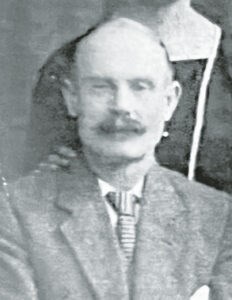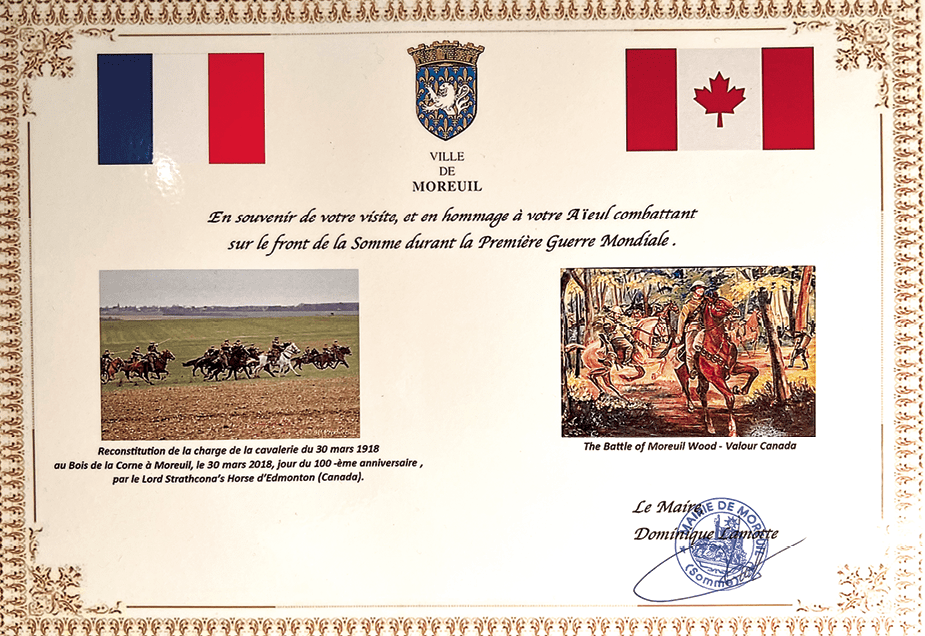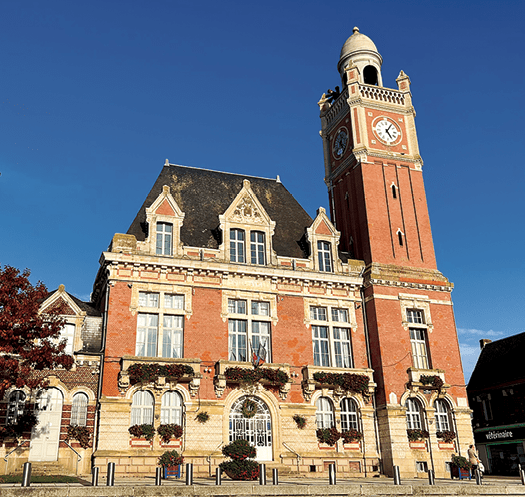Meaningful remembrance of dark times
BY PAUL MCDOWELL Special to the Voice
Time. We live in the present. We can feel the future with our intentions and hopes, and we can experience the past with our memory. Is time a physical thing or is it of thought? As a 62-year-old Canadian born of British émigré parents, growing up I generally regarded history as boring. Sure, World War II was interesting, but anything before that was dull. The most you could experience would be old, fast-playing black-and-white silent films of World War I. They seemed no more meaningful than Charlie Chaplin to me. We as Canadians for the most part know of Vimy Ridge and how Canada was then seen as a nation unto its own from such a determined victory. But there is so much more than what we normally see, beyond Vimy. Recently, I felt a small part of that beyond.
My grandfather, Ambrose McDowell, was something of a family and local hero from his small coal-mining town in the North of England. He was awarded the Distinguished Conduct Medal for his gallantry on March 29, 1918, during World War I, in leading a charge to win back from advancing German forces the village of Mézières in France. I never knew him. He died of coal-mining-induced cancer before I was born. My father had a record of his citation, and it hung in our home.

My father passed away at 96, eighteen months ago. It was then that I decided to learn more about Ambrose and the events at Mézières. Combing through numerous history books, websites, and records one can build much of the story. As I learned more, I became more intrigued and awed by what happened. And ultimately, surprised and humbled by his actions, by the sacrifices of others and, most surprisingly, by the role of Canadian soldiers at the time.
My wife Darlene and I were recently on vacation in Europe and before setting out on this trip I thought it would be good to revisit where Ambrose had been. Darlene had the idea that I try to contact Mézières to see if we could learn anything before our visit. First, how do I even pronounce it? Second, where is it? There are multiple Mézières in France. After some research, I found it in the Picardy Region in Northern France, now called Mézières-en-Santerre. A pleasant village of 500 or so people a few kilometres east of Moreuil, a town of 5,000, which is in turn a few kilometres east of Amiens, a city of 134,000. Travel back into the past with me if you would…
March 21, 1918. After years of stalemate on the western front lines in France, the Germans now have more forces to use as they have ceased hostilities with Russia. They launch Operation Michael, and with massive and devastating forces, in just a week they have advanced the front line westward by 30 miles.
March 28, 1918. Ambrose McDowell’s unit, the 11th Battalion of the Durham Light Infantry, find themselves chased out of the area around Mézières and seek refuge in a nearby forest. It’s the night before Good Friday, the moon is full, but it is raining and cold. Some 130 men huddle in those woods overnight hiding from the enemy. The next day, their new captain decides to attack and try to take back Mézières. At 4 PM on Good Friday, March 29, 130 men, including Ambrose, charge out of the wood and enter the expansive pasture between them and the village. Racing across that deadly open area— easy for enemy gunners to see—some 100 soldiers are cut down by machine gun fire. As men are falling and wavering, Ambrose charges on in the face of this hail of lead and makes it to the village. Others are inspired by his example and charge on, but only he and 19 comrades make it in. It is not to last. The occupying forces are too strong and the British have to retreat. Only about three soldiers, including Ambrose, make it back.
The next day, March 30, 1918, the Durham Light Infantry 11th Battalion are now in retreat as all allied forces are withdrawing. If the Germans capture Amiens, just down the road, they will control the rail lines to Paris. The next set of woods, outside Moreuil, offers little hope—the Germans have seized that area too.
As if on cue, some 200 Horse Mounted soldiers from the Canadian Calvary Brigade charge from across the field around Moreuil and recapture the woods, impeding the German advance. Combined, the Allied forces hold the line and prevent the capture of Amiens, less than 30 km away. Nearly 150 Canadians are wounded or killed in this action.
It’s now 104 years later. Darlene and I visit Mézières in October 2022 and are greeted by their town leadership. Mme. Ellen Petit of Mézières had arranged a wonderful and respectful reception for us. Her daughter, Sarah, was a gift to us as translator, helping us all connect. Mme. Petit had arranged for local officials to be present.
At the local cemetery honouring the war dead, we were presented with a bouquet of flowers commemorating “Our Canadian Friends.” Feeling overcome with emotion, I laid the flowers at the base of the memorial. Just 300 metres behind me is the very forest and intervening pasture Ambrose and his fellows had been 104 years before. We hold a minute of silence. All of us quietly feel a tear or more in our eyes.

We all then drive several kilometres to a memorial dedicated to Canada outside of Moreuil Woods. There, another half dozen French citizens have come out to greet us. They hold two large Canadian Flags: the Red Ensign and the Maple Leaf. We all stood in another moment of silence to the fallen. Afterward we joined together in singing Le Marseille and then O Canada. It doesn’t end there. Darlene and I are then taken into Moreuil, where the Mayor greets us and we learn of the importance of Canada’s role in basically saving the town and stopping the German advance in the spring of 1918. Mayor M. LaMotte presents us with a plaque commemorating “The Battle of Moreuil Wood-Valor Canada.”

Even the local newspaper came to interview us. So many people there were so warm, welcoming and honouring of us in memory of Ambrose and the Canadian soldiers. M. Armand Prin, the journalist who interviewed us, said it so well: “Thank you for reviving the need to never forget all that we owe to our ancestors, to all those soldiers from so far away, especially from Canada, who fought for our freedom.”
Jean Paul Brunel was a local historian and expert of the Battle of Moreuil Wood, and took us to the very site where the battle occurred. To this day, it seems like storybook stuff, the stuff of corny movies: fighting to the last man, bravery in the face of almost certain death, retreating, feeling cornered and then, from seemingly out of nowhere, the Calvary arrive and save it all.
Darlene and I now feel a strong connection with many people from Moreuil, Mézières, and area. Certainly a debt of gratitude. For honouring us, my grandfather Ambrose, the fallen, and Canada. We now have friends for life thanks to Ellen Petit. From the all the terrible death and struggle of war, friends can emerge, even over a century later.
Are coincidences and time meaningful? I was born 42 years to the day after the Battle of Moreuil Wood. My dad passed away on Good Friday April 2, 2021—103 Good Fridays after his father Ambrose had fought in Mézières.
At Vimy, the majestic Canadian Memorial stands tall. Darlene and I paid homage there as well. As the mist and sun rose that morning, we learned that the Canadian rendering of honour does not include garlands, or strong soldiers, or even any depiction of weapons. On the one side we see statues of a mourning mother and father. At the front, standing alone, looking down sadly from Vimy Ridge, is Mother Canada. I saw the sun rise from behind her head that morning and felt humbled by the past and hopeful for the future.
If time is experienced in the here and now as thought, if intentions of the future rely on lessons of the past, then let us remember for the sake of the future.
Let Us Not Forget.


